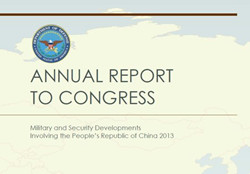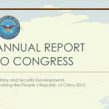
China’s Response to Pentagon Report “Baseless, Counterproductive”
Publication: China Brief Volume: 13 Issue: 10
By:

The congressionally-mandated Annual Report on Military and Security Developments Involving the People’s Republic of China has riled Beijing since its inception. Chinese leaders have resented being singled out, calling the report a product of “Cold War thinking” and contradictory to the spirit of U.S.-China relations. Xinhua immediately responded to the release of this year’s report and the response was picked up quickly by other news portals, presumably by direction (Xinhua, May 7; Global Times, May 7; People’s Daily Online, May 7). By now, the United States Government probably is accustomed to such accusations, and there is little new in the Chinese response. What is remarkable about Beijing’s statements about the annual report is that they reveal what might be a growing divorce between the propaganda and policy systems. At the very least, China’s counterproductive response—translated into English for foreign consumption—suggests an uncertain commitment to dialogue over the challenges in U.S.-China relations.
The first example of where the Propaganda Department seems out of kilter with Chinese policy is Xinhua’s problem with the Pentagon report’s statement that “China’s military modernization is designed to ‘improve the capacity of its armed forces to fight and win short-duration, high-intensity regional military conflict’” (Xinhua, May 7). This language, however, is borrowed almost directly from Chinese-language publications. For example, China’s most recent defense white paper stated “China’s armed forces firmly base their military preparedness on winning local wars under the conditions of informatization” (Xinhua, April 16). At the 11th National People’s Congress, Premier Wen Jiabao in a speech to PLA cadre noted the need for the Chinese military to “continuously improve their ability to fight and win local wars under informatized conditions” (People’s Daily Online, March 5, 2012). Finally, former President Hu Jintao and the Central Military Commission issued an assessment of People’s Liberation Army (PLA) capabilities in January 2006 that stated that the PLA’s inability to fight and win local wars was part of the “principal contradiction” (zhuyao maodun) that military modernization needed to resolve (“The Pentagon-PLA Disconnect: China’s Self Assessments of Its Military Capabilities,” China Brief, July 3, 2008; PLA Daily, January 1, 2006). These are not off-the-cuff statements or remarks of questionable authority; yet, they seem to reflect a Chinese policy of which the propagandists are ignorant or denying.
The second example where Chinese propaganda runs counter to China’s self-defined interest is the area of military-to-military engagement. Xinhua stated “The essence of the report contradicted the U.S.-China common understanding on developing military ties” (Xinhua, May 7). Ironically, Xinhua quotes the same joint U.S.-China affirmation by presidents Barack Obama and Hu Jintao in January 2011 invoked in the Defense Department’s report to support its statement that “the need for a robust U.S.-China military-to-military relationship that builds trust and helps manage friction continues to grow” (p. 61). The report also highlights dramatic transformation from “a poorly equipped, ground forces-centric military into a more capable force that is assuming diverse missions well beyond China’s shores.” This is explicit recognition that China is taking on a justified role in the world and that the latest defense white paper, The Diversified Employment of China’s Armed Forces, provides a usable set of principles for understanding the evolution of the PLA (Xinhua, April 16).
Chinese press statements suggesting that a “groundless report” has failed to address China’s transparency are nothing new, but Xinhua’s repudiation of concerns about PLA budget transparency and cyber-espionage is akin to calling someone a liar before listening to a single word. U.S. interlocutors have engaged China on the military budget issue at an official level and in Track II discussions. Moreover, knowledgeable analysts have explained in clear terms where such transparency on Beijing’s part is desirable and have done so in ways that do not jeopardize China’s security (“The 2013 Defense White Paper in Perspective,” China Brief, April 25). If this problem is reflected elsewhere in the Chinese analytic community, the presumption that the U.S. Government willfully is going to distort its public analysis of China may be one of the greatest barriers to any sort of “New Type of Great Power Relationship.”
Perhaps because of the Western media’s focus on the cyber-espionage elements of the report, propaganda officials thought it necessary to issue separate articles dealing with just the cyber allegations. This response, however, misconstrued and distorted the nature of the evidence against at least some Chinese involvement in computer network exploitation internationally. None of the major reports on Chinese activities in cyberspace—ranging from the GhostNet report in 2008 to the Mandiant report released earlier this year—relies solely on IP address identification as analysts with the PLA’s Academy of Military Science (AMS) suggest (People’s Daily. May 8; Xinhua, May 7). In at least one case, the evidence includes the transfer of documents on a computer to which Chinese officials did not have physical access but, nevertheless, found their way into the hands of border officials. Dismissing these reports and foreign concerns as the so-called “China Hacker Theory” (zhongguo heike lun) eliminates the possibility for any meaningful discussion, even as cyber has become a topic for the highest-level bilateral discussions (Shanghai Evening Post, May 7; Chongqing Morning Post, February 21). Propagandists’ adoption of “China Hacker Theory” marks a dangerous shift. In contrast to the “China Threat Theory” of years past, the “China Hacker Theory” dismisses the evidence available rather than inviting an objective assessment of China’s behavior.
Using AMS professionals to shill on the cyber issue also is a little disingenuous and a misuse of their expertise due to the academy’s work on assessing the requirements of military intelligence. In the Science of Military Intelligence—a textbook for PLA officers—published more than a decade ago, AMS researchers noted in their chapter on the future of military intelligence that information relevant to military decision making was increasingly going on networks (xinxi wangluohua) [1]. Gaining access to them would be one of the biggest technical challenges for military intelligence to remain relevant going forward. Moreover, two of “basic characteristics” (jiben texing) of intelligence are, one, its continuous nature (lianxuxing or bujianduanxing) and, two, its diversity (duoyangxing). In the explanation of these characteristics, the AMS authors are directing readers to recognize that intelligence collection methods and process must follow the movement of information relevant to decision makers and that constant adjustment is necessary [2]. By China’s own standard of what their intelligence agencies, especially those under the General Staff Department, should be doing, if they are not involved in getting access to networks, then they are negligent. Judging from the movement of intelligence personnel throughout the PLA, this probably is not the case (“PLA Personnel Shifts Highlight Intelligence’s Growing Military Role,” China Brief, November 5, 2012).
In sum, many of the Chinese criticisms of the Pentagon’s annual report on Chinese military developments either are contradicted by Beijing’s stated policy or do not invite further discussion, contravening the spirit of U.S.-China relations. Although the civilian control over the PLA may be a more interesting topic for speculation, it is the propaganda apparatus that may be the rogue elephant. Given Beijing’s commitment to engaging the United States on a “New Type of Great Power Relations” and to a mutually-beneficial U.S.-China relationship, the vitriolic response to one of the most objective Pentagon assessments seems out of place. Assuming the U.S. Government and other foreign analysts are unable to read Chinese policy statements gives the impression that Beijing is talking out of both sides of its mouth. In this respect, the Chinese commentary seems—to borrow Xinhua’s language—both baseless and counterproductive.
Notes:
- Zhang Xiaojun, chief ed., Junshi qingbao xue [Science of Military Intelligence], Beijing: Academy of Military Science, 2001, pp. 173–202.
- Ibid., pp. 11–12.





